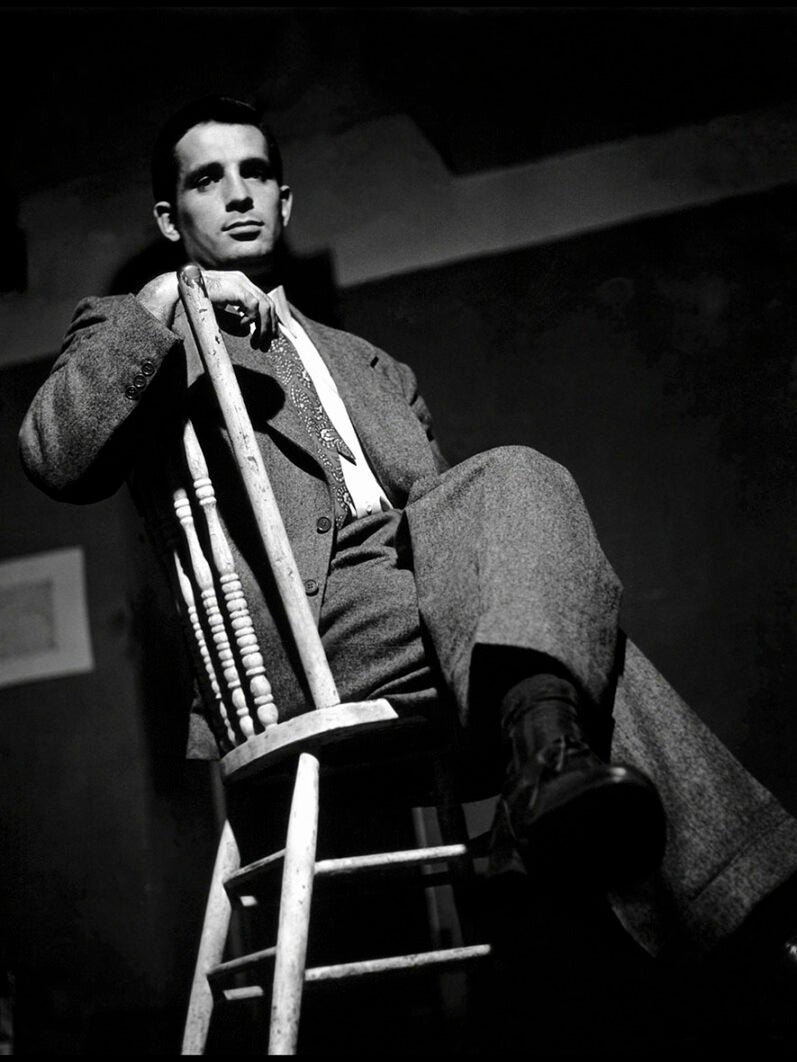On the Road Again Jack Kerouac

Information technology's late 1959, in the Eisenhower era; a moment when postwar America is enjoying peace and plenty. Ribbons of multi-laned concrete criss-cross the country, equally the interstate highway organization started nether the regular army general president has turned the US into an machine-obsessive lodge (decimating the once mighty bi-coastal runway system). A baby blast is in progress. So as well is a drift for many young married couples out of the urban center and into the new suburbs, where all is as homogenised and unmenacing as mass-produced white bread.
Boob tube has become the new narcotic of pick for enervated stay-at-home mums and all those war veterans-turned-commuting executive dads. And a besuited, bespectacled talk evidence host named Steve Allen has get an early on star of this fledgling medium. His show is mainstream entertainment – comic sketches, actors promoting their new films – with the occasional hipster indulgence. Allen sees himself as a public figure poised between popular and beatnik sensibilities, and one who plays jazz pianoforte rather well. And on tonight in 1959 there he is, live in the NBC studios in New York, talking about a jazz-and-words album he has just recorded with the hottest American writer of the moment: a certain Jack Kerouac, whose novel On the Road (published two years before) remains a global sensation. And so Kerouac steps forward, dressed in an open up shirt and a jacket. He talks about how he wrote the novel in 3 weeks and reads a long quasi-lyrical passage to the accompaniment of jazz riffs being played live on piano past Steve Allen himself.
This clip (which can be found, of course, on YouTube), of one of the founding members of the Shell Generation on prime-fourth dimension American television, now seems both primitive and astonishing. Sightings of writers these days on talk shows on either side of the Atlantic are rare events.
More tellingly it's a reminder of how Kerouac – a working-class guy with French-Canadian heritage – became an instant cultural miracle. Built-in 100 years ago, on 12 March 1922, he grew upwards in the low-rent factory town of Lowell, Massachusetts. He played American football on a scholarship at an Ivy League university (Columbia). He dropped out. He joined the Merchant Marine (the blue-collar selection back so for seeing the world). He then tried to find his way as a author – a picaresque bohemian existence of inexpensive digs, cheap booze, endless cigarettes, easy sexual hook-ups. And then – in one of the 20th century's almost historic feats of literary prestidigitation – he bought a giant roll of industrial newspaper, threaded information technology through his typewriter, and, fuelled by a pharmaceutical called Benzedrine (also known equally "speed"), he banged out his romanesque chronicle of getting lost in America and Mexico with his fictional sidekick, Dean Moriarty, in just three weeks.
Beware beingness the harbinger of a cultural motion – especially in a mercantile civilisation where the inability to capitalise on success quickly leads to being marginalised. Later on On the Route, Kerouac went on to publish many other novels and travelogues – notably his Zen-mystic-on-the-West-Declension chronicle, The Dharma Bums, and Big Sur, his roman-à-clef about a immature writer doing all sorts of excessive things in the Bay Surface area, then swapping the pressures of popularity for the beachy wonders of the Pacific Coast Highway. But by 1969 Kerouac was dead, at the historic period of 47. He'd lost his fame. He'd lost his cursory literary gravitas. He'd lost his absurd, chiseled looks. Swollen by alcohol, frequently breathless, often sputtering his back up for right-wing causes (and even defending the Republican senator and communist witch-hunter, Joe McCarthy), he died a broken man in a shabby corner of Florida, looked after by his third wife and the uber-Cosmic mother he revered.
"Fame is a bee," noted Emily Dickinson (some other, albeit very different, product of Massachusetts). "Information technology has a vocal–/it has a sting–/Ah too, information technology has a wing". During his lifetime, Kerouac attracted plenty of vituperative bad press – from Truman Capote'due south now far-as well-quoted denunciation of On the Road ("That isn't writing; it's typing") to Hunter S Thompson's scathing late-career appraisal of him. Calling Big Sur "a shitty, stupid book", he then delivered the coup de grace: "the human is an donkey, a mystic boob with intellectual myopia."
Content from our partners



Indeed, it is now easy to deride Kerouac equally a i-shot wonder, creatively overshadowed past the vital literary achievements of his two almost notable Trounce colleagues – William Burroughs and Allen Ginsberg. But it'southward important to contextualise his achievement. "The road" is an essential cornerstone of American mythology, as information technology embodies the notion that, inside the epic frame of the American continent, there is the constant possibility of personal reinvention. Kerouac tapped into this aspirational fantasia about vanishing into the cartographic void on a quasi-existential quest for your own identity. He used the road as a metaphor for the rugged individualism that we in united states like to consider part of the national psyche, but which, in fact, is nothing more than than a pipe dream. American men imagine themselves as Dean Moriarty, the eternal free spirit, who lights out with Kerouac's narrator, Sal Paradise (himself on the run from twenty-four hour period-to-day realities back e). Nosotros accept long dreamed of hitting bars with characters named Montana Slim, or heading south of the border for general debauchery in pre-dare Mexico. But for all such reveries of personal freedom, the American white male persona remains, in truth, closer to Sinclair Lewis'southward Babbitt – the ultimate workaday conformist – than to Kerouac's wild boys.
No wonder that the novel struck such a profound chord at the time of its publication – both at abode and abroad. Kerouac and his fellow Beats were a bohemian counterweight to the increased affluence and embourgeoisement of the postwar era. In the freewheeling Sixties and Seventies (the years before neo-conservatism and Reaganomics completely transformed the trajectory of the country), the novel was taken up every bit a totemic countercultural piece of work – just as The Catcher in the Rye was adopted as one of the great "me confronting the system" American tomes. This is despite the fact that in his boozed-out final years, Kerouac often derided hippiedom and the antiwar movements equally essentially un-American.
Jump-cut to our precarious, hyper-consumerist moment: Generation Z is dealing with a world in which the majority of all major cities are unaffordable to those not working in finance or tech; where hipsterism is now signalled by wearing edgy spectacles and sipping a flat white while Zoom-conferencing on a MacBook. As such, some 65 years on from its initial publication, On the Route has almost become a remembrance of things by, a throwback to more than fluid times.
[See as well: Andrea Elliott's story of American poverty is not-fiction writing at its all-time]
Despite the reactionary pronouncements of his later days, Kerouac was i of those writers whose life had more cultural import than his uneven piece of work. Just his defining novel (for me) even so stands as a singular accomplishment. Yes, information technology's a structural mess. Yes, its overindulgences are manifold. Simply with its finger-popping prose and lyrical riffs, information technology remains the novel that captures the rhythms of bebop and encapsulates the dream of an America nonetheless laden with possibilities:
"So in America when the sun goes down and I sit on the old broken-down river pier watching the long, long skies over New Jersey and sense all that raw land that rolls in ane unbelievable huge bulge over to the Due west Declension, and all that road going, and all the people dreaming in the immensity of it, and in Iowa I know by now the children must exist crying in the land where they allow the children cry, and tonight the stars'll be out, and don't you know that God is Pooh Conduct? the evening star must be drooping and shedding her sparkler dims on the prairie, which is just before the coming of complete night that blesses the earth, darkens all the rivers, cups the peaks and folds the final shore in, and nobody, nobody knows what's going to happen to anybody besides the forlorn rags of growing former…"
The wonder of Kerouac'due south muscular, free-course, imagistic language still astonishes. He remains an essential American mythologiser – one caught up in that backstreet world of maverick life, before it was transformed past the harsh social Darwinism of capitalism. The title of his one towering accomplishment became a turn of phrase that went global, and his name became an adjective. That strikes me as not a bad legacy for a boy from the mean streets of post-industrial New England. A hundred years after his birth, we nevertheless want to live that Kerouacian vision of life as one long absurd stretch of highway.
Douglas Kennedy'southward new novel, "Afraid of the Low-cal", is published by Penguin on 7 April.
Source: https://www.newstatesman.com/culture/books/2022/03/on-the-road-again-jack-kerouacs-contested-legacy
0 Response to "On the Road Again Jack Kerouac"
Post a Comment